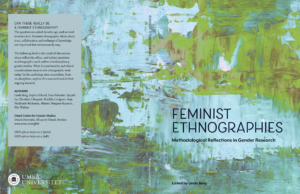In spring 2025 Historical Studies at Södertörn University offer a PhD course on academic writing: Academic writing as genre and method in Cultural Sciences, 7.5 credits.
Course description: Through practical exercises and assignments, this course aims to develop the participants’ academic writing skills. Here writing is considered a central part of qualitative scholarly work, both in relation to the process and text production. Questions about the importance of writing both as a method and as a form of presentation are addressed in relation to knowledge production in cultural sciences. The course deals with central currents of thought on academic writing and uses participants own writing project as a point of departure for both reflection and practice. It runs at a pace of 25% throughout the spring semester and consists of monthly meetings and online seminars.
Registration is continuous. Please contact Kim.silow.kallenberg(at)sh.se.
Extended information about the course:
Entry requirements
Admitted to doctoral studies
Learning outcomes
After completing the course, the doctoral student is able to:
· critically examine and discuss the field of writing, text production and relevant genres within cultural sciences
· describe and discuss central aspects of the academic writing process with deeper insight
· demonstrate good knowledge of the relationship of writing to knowledge production in cultural sciences
· place their own and others’ writing in a scholarly context and reflect on the importance of writing as part of methodological and analytical work
· apply the theoretical and practical knowledge gained during the course in their own scholarly writing.
Course content, modules and examinations
The course aims to develop participants’ academic writing through practical exercises and assignments. A starting point for the course is that writing is a central part of scientific work in relation to qualitative methods. Questions about the importance of writing both as a method and as a form of production are addressed in relation to knowledge production in cultural sciences. The course deals with some central currents of thought on academic writing.
Course design
Teaching takes place in the form of lectures and seminars as well as oral and written exercises.
Examination
The course is examined through written and oral seminar assignments, active participation in the seminar discussions and a final home exam. Active attendance at seminars, completed seminar assignments and a written home exam are required to pass the course. A maximum of one seminar can be compensated with other assignments.
The grading criteria are distributed prior to the start of a course or module.
If a student has a certificate from Södertörn University for compensatory support, the examiner has the right to decide on an adapted examination or alternative form of examination in accordance with Södertörn University’s regulations.
Restrictions on accreditation
The course may not be accredited as part of a degree if the contents are partly or wholly the same as a course previously taken in Sweden or elsewhere.
